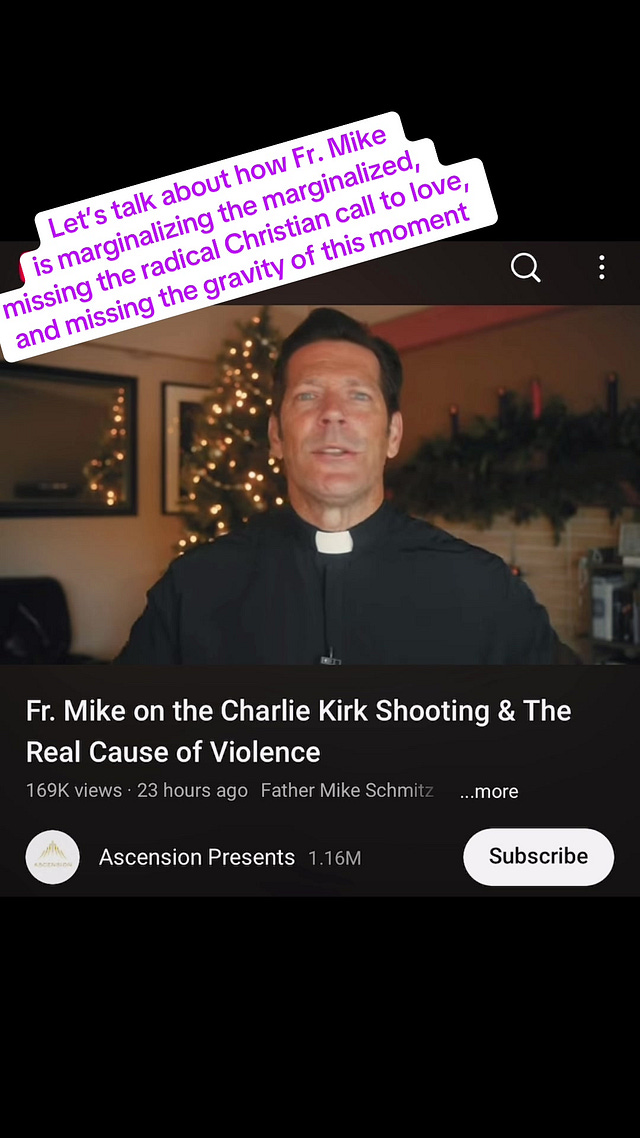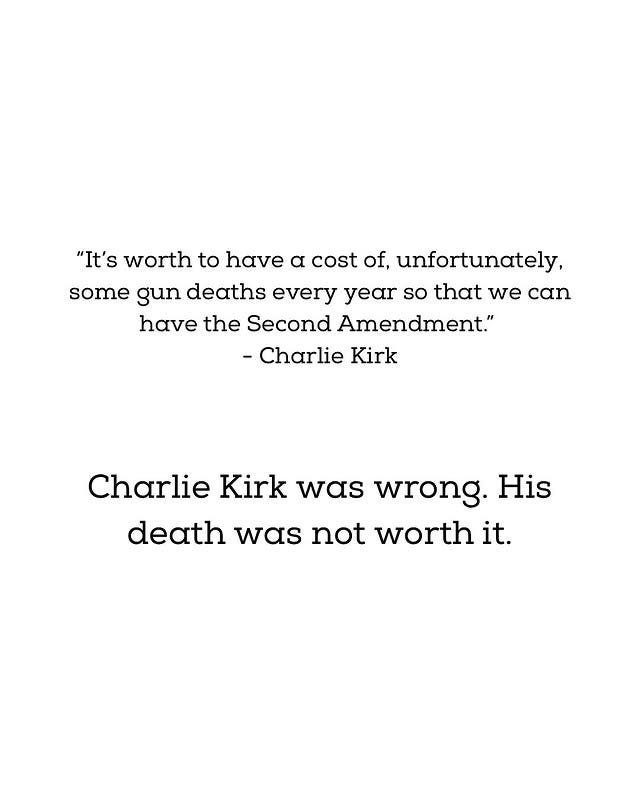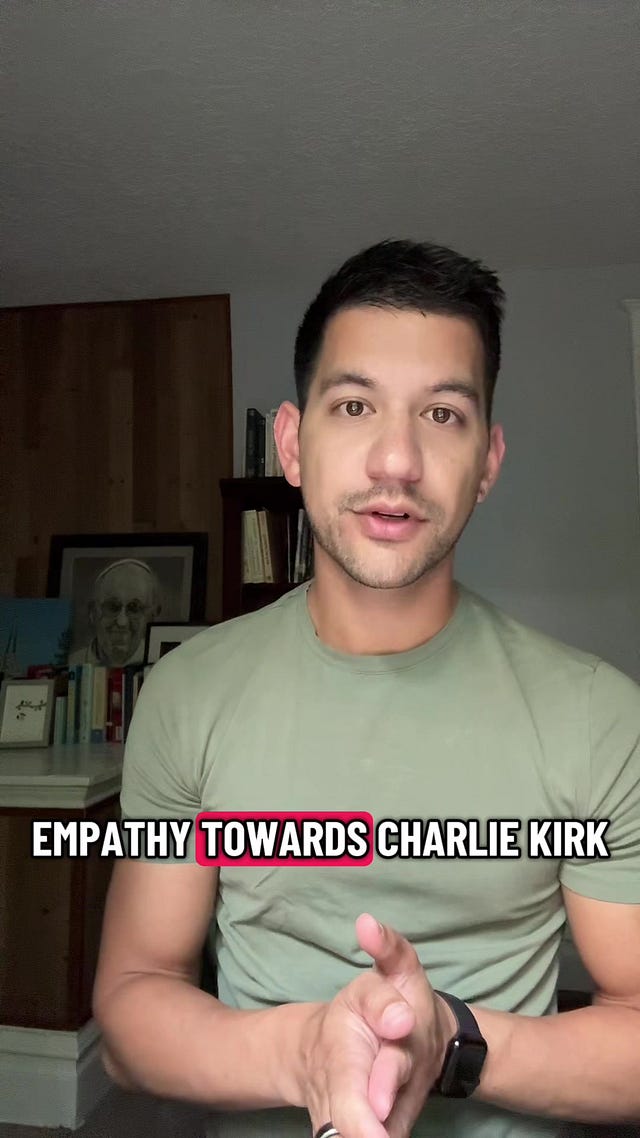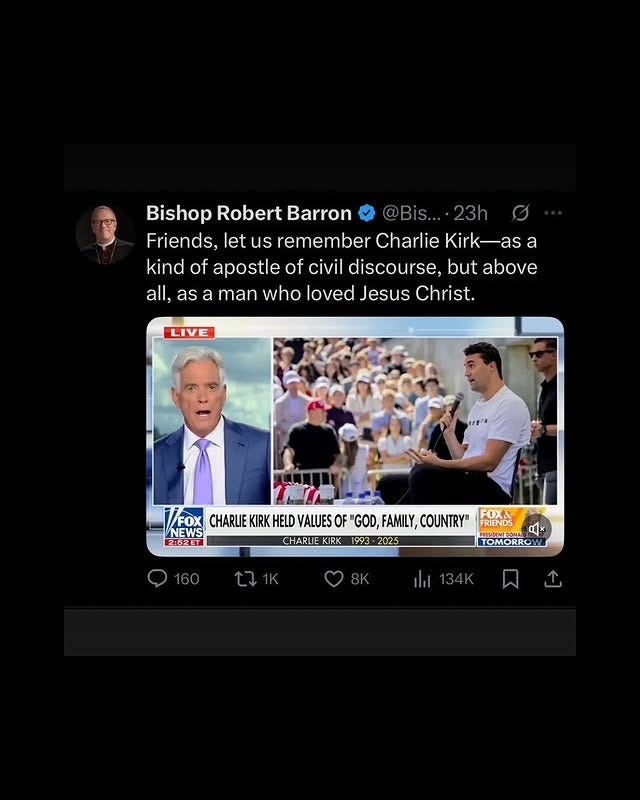Four reflections on the death of Charlie Kirk
It's ok if you're struggling to feel empathy
Please note that this piece includes discussions of violence, political violence, threatening messages including explicit threats of sexual violence, and other content that may not be suitable for all readers.
On September 10, Charlie Kirk was shot dead at the age of thirty-one. He was a lifelong Christian who ran the conservative advocacy group Turning Point USA and was most known for inviting students on college campuses to debate with him on a variety of topics. While speaking at Utah Valley University, he was killed by a twenty-two-year-old who allegedly was a pro-Trump Christian ahead of the 2020 election but had recently had spoken with his family and others about “hate” being spread by Kirk.
Kirk’s death has elicited a variety of polarizing and polarized responses. ABC suspended Jimmy Kimmel’s late-night talk show after Kimmel criticized MAGA responses to the shooting, suggesting the shooter was “one of them,” and said that Trump’s responses to it were like those of “a 4-year-old mourning a goldfish.” In the initial weeks after the shooting, at least 100 people had faced professional repercussions due to their public responses to it. Some were making light of or celebrating the murder, while others stated that they faced backlash for merely “posting evidence that Mr. Kirk was not an uncontroversial figure.” U.S. attorney general Pam Bondi said she will “absolutely target” those who use “hate speech” in the wake of the killing.
On the other hand, many have responded to the tragedy by praising Kirk, including many Catholic leaders. On Fox & Friends, Cardinal Timothy Dolan called Kirk a “modern day Saint Paul,” saying:
“He was a missionary, he's an evangelist, he's a hero. He's one I think that knew what Jesus meant when he said the truth will set you free.”
Bishop Robert Barron has praised Kirk in a number of public statements, calling him “a man of great intelligence, charm, and goodness of heart… committed to open dialogue” and saying that “the most important thing” to Kirk was his Christian faith. Barron called Kirk “a kind of apostle of civil discourse.” Bishop James Conley praised Kirk, saying he “spoke the truth” and was “a martyr for the truth.”
What makes Kirk controversial?
Here, I’ll give just a few examples of why people were troubled by Kirk’s work and are resistant to giving him unqualified praise…
Kirk on race and racism
“You wanna go thought crime? I'm sorry. If I see a Black pilot, I'm gonna be like, ‘Boy, I hope he's qualified.’”
Kirk qualified that “that’s not what I believe” and that these are “unhealthy thinking patterns.” He blamed “the left” for his unhealthy patterns, saying that the left has encouraged such thinking by lowering standards for racial minorities in the professions.
Many have taken issue with the way Kirk enables the justification of racism and condescension towards black and brown professionals. Kirk has not provided evidence that black pilots have been subjected to lower testing or training standards, but encourages his followers to just assume this is the case. In this way, many have argued that he contributes to racist views and encourages the marginalization of black and brown professionals.
Another examples comes after the Supreme Court ended affirmative action in college and university admissions in 2023. After the decision, a number of black leaders spoke out. Michelle Obama had said that, while affirmative action “wasn’t perfect,” it helped provide “new ladders of opportunity for those who, throughout our history, have too often been denied a chance to show how fast they can climb.” Barack Obama likewise said that affirmative action policies had flaws but that they “allowed generations of students like Michelle and me to prove we belonged.”
In response to this and similar statements, Kirk said on his show:
“If we would have said three weeks ago [...] that Joy Reid and Michelle Obama and Sheila Jackson Lee and Ketanji Brown Jackson were affirmative-action picks, we would have been called racist. But now they're comin' out and they're saying it for us! They're comin' out and they're saying, ‘I'm only here because of affirmative action.’
“Yeah, we know. You do not have the brain processing power to otherwise be taken really seriously. You had to go steal a white person's slot to go be taken somewhat seriously.”
Here, people have taken issue with Kirk’s statements for a number of reasons. First, he clearly is speaking derogatorily towards these successful women when he says they have low “brain processing power.” But he also dismisses the injustices they have faced and misrepresents what they are arguing. The Obamas are not arguing that affirmative action gave them an unfair advantage, but that it removed barriers that black Americans had previously faced by forcing a certain amount of acceptance into American society. Rather than Kirk seriously considering what the Obamas mean and offering a thoughtful response, he chooses the least charitable interpretation of their words and uses it to speak derogatorily about them.
Likewise, Kirk has openly said that passing the Civil Rights Act was “a huge mistake.” And Kirk said of Martin Luther King, Jr.:
What’s notable here in light of Kirk’s death is how he disparages a Christian minister and civil rights activist who died from a political assassination. Indeed, Kirk’s statements are not far afield from the statements made by many of those who are currently facing adverse employment action because of their public statements about Kirk.
On Leviticus and stoning gay people
In 2024, YouTube creator “Ms. Rachel” created a video emphasizing the importance of “love thy neighbor” in the Bible.
Kirk responded to this in a June 2024 podcast episode where he said:
“She's not totally wrong. […] The first part is Deuteronomy 6:3-5. The second part is Leviticus 19. So you love God, so you must love his law. How do you love somebody? You love them by telling them the truth, not by confirming or affirming their sin. And it says, by the way, Ms. Rachel, might want to crack open that Bible of yours, in a lesser reference — part of the same part of scripture is in Leviticus 18, is that thou shall lay with another man shall be stoned to death. Just saying. So, Ms. Rachel, you quote Leviticus 19, love your neighbor as yourself. The chapter before affirms God's perfect law when it comes to sexual matters.”
What Kirk meant by this comment has been debated. But what I’ll highlight here is how he highlights that Leviticus recommends stoning to death men who sleep with men and says that that chapter of Leviticus is “God’s perfect law when it comes to sexual matters.” Whatever nuance Kirk may want to give, those comments could encourage his followers to commit violence against people like me.
When it comes to trans persons, he has made a number of disparaging comments and argued for prosecutions of those who are giving currently legal medical care. Rather than encouraging research and debate, he has argued for immediate prosecutions that operate outside of the American judicial system. He has said, “We need to have a Nuremberg-style trial for every gender-affirming clinic doctor. We need it immediately.”
And in a March 2023 podcast, he called LGBTQ+ people like me who choose to be civically engaged “groomers”:
“By the way, the buried lede of this is that 60 percent of this school board is LGBT, is gay. The question is, do Christians run for school boards as much as the LGBT community does? No. As I said yesterday, which is groomers can't reproduce, so instead they recruit. So, they go serve on school boards. And they go do drag queens. And they do all this other sort of disgusting nauseating stuff.”
On public executions
On another episode of Thoughtcrime, Kirk discussed public executions and why children should watch them. He said of capital punishment:
“It should be public, it should be quick, it should be televised.”
"You could have like 'Brought to you by Coca Cola' and no, I'm not kidding. By the way, I would totally tune in to see some pedo get their head chopped off. Convicted by a jury of their peers. I'm talking about a real thing.
…
“I think at a certain age it's an initiation. No, but hold on, you see, if all of a sudden, you look at some of these savages like in Indiana, there was this guy that went in and killed a pregnant woman and her three kids. And, you know what, I want to watch that execution, that'll make my day better. I want to see him on a public block and get him be publicly executed, and I think that would be justice. You think children should have … you should see … what is the age? At what age should you start to see public executions?”
Kirk said that these public executions, viewed by children as well as adults, “should also be taken in a holy way,” meaning that “this is heavy.”
The conversation among the podcast participants continued:
Kirk: I want you to imagine everyday, all of a sudden they said: "And today, remember that awful five, you know, the guy that went and shot up a school?" Because, you know, left hates school shooters, and so do we and, but they focus on the gun, I think they're evil. So, you know, you take one of these school shooters and they say, "Today we're going to publicly execute this person." And they read off —
Posobiec: How about the Super Bowl?
Kirk: Yeah, or the shooters at the Super Bowl thing, and you read off what they did and you don't celebrate it, you know, you just say, "Look, this is what they did and if you do this, this will be your fate," ready, set, go. Boom, end of life. And say —
Kirk: As a question — Here's a question for anybody that might be, you know, not persuaded. Would crime go up or down?
Bowyer: It would go way down
Kirk: Down. So then why is this even a question?
Responses to the attack on Nancy Pelosi’s husband
In 2022, a man broke into Nancy Pelosi’s home, shouting, “Where’s Nancy?” The man confronted her husband, Paul Pelosi, and brutally attacked him with a hammer, fracturing his skull and damaging his arm and hands. Shortly after the arrest of the assailant, Kirk discussed the attack on his podcast.
While Kirk condemned violence, he also condemned those connecting the violence to right-wing extremism and made a gesture towards a conspiracy theory that the attack was because Paul Pelosi was engaged in an illicit gay sexual tryst gone awry:
“Why is the Republican Party, why is the conservative movement to blame for gay, schizophrenic nudists that are hemp jewelry-makers breaking into somebody’s home, or maybe not breaking into somebody’s home? Why are we to blame for that exactly?”
Kirk then said that the alleged attacker should be bailed out of jail by “some amazing patriot”:
“And why is he still in jail? Why has he not been bailed out? By the way, if some amazing patriot out there in San Francisco or the Bay Area wants to be a midterm hero, someone should go and bail this guy out… Bail him out and then go ask him some questions.”
Here, Kirk’s supporters did exactly what he argued against when it came to Pelosi’s attacker: attributing political motivations before we have all of the facts. And one can only imagine how Kirk’s supporters would have reacted if a major commentator had called for a “patriot” to bail out Kirk’s shooter after his arrest.
On Pope Francis
In a discussion of Catholicism with Michael Knowles, Kirk referred to Pope Francis as “this Marxist who calls himself the head of your church.”
Kirk goes on to say:
“I mean that as someone who loves the Catholic impact on the world that says it openly and by the fruit, you will know it and you have very Marxist fruit. Why should I care at all what that guy from Argentina has to say? Well, because you care what your pastor has to say, yes, but if my pastor starts saying crazy things, I find a new pastor. So if your pope starts saying crazy things, maybe he’s not the pope and maybe that’s a bad representation.”
The second amendment
At a 2023 TPUSA Faith event, Kirk spoke about how having the Second Amendment is “worth to have a cost of… some gun deaths every single year.” He said:
“I think it’s worth it. It’s worth to have a cost of, unfortunately, some gun deaths every single year so that we can have the Second Amendment to protect our other God given rights. That’s a prudent deal. It is rational… Nobody talks like this. They live in a complete different universe. So then how do you reduce? Very simple… I don’t know. How did we stop shooting at baseball games? ‘Cause we have armed guards outside of baseball games. That’s why.”
It’s important to note here that the actual reason we don’t have shootings at baseball games may be because guns aren’t allowed into baseball stadiums. But what’s notable here is how he accepts the cost of, for example, kids being shot while at Mass where I live in Minneapolis. He implicitly argues that those children’s deaths are “worth it.”
The professor watchlist
In 2016, Kirk launched the “Professor Watchlist,” a database that his organization Turning Point said listed professors who "discriminate against conservative students, promote anti-American values and advance leftist propaganda in the classroom." Professors have been added for various reasons and, because of the list, have been targeted for harassment and threats.
For example, Laura Beth Nielsen wrote an op-ed in 2017 calling to restrict hate speech, arguing that such speech could lead to adverse physical and mental health outcomes. As a result, she was added to the Professor Watchlist with the tag “anti-First Amendment.” She then received weeks of hateful emails and letters, including one which said, “I’m going to rape you in front of your children.” (It’s important to note that Pam Bondi’s comments about hate speech that I noted above might land her on a similar list if Kirk were to compile one for political leaders.)
Another professor said he landed on the list for researching racial inequities in academia and that, as a result, he, his colleagues, and his family received emails and social media messages telling him to die.
These are just a handful of the areas where Kirk has stoked controversy and acted in ways that have led to harassment and threats of violence.
1. This is a human being
Many people believe that Charlie Kirk held vile, disgusting, hateful views that he passed on to his followers in ways that have incited harassment, threats of violence, and hatred.
I am among these people. He said these things about people like me, people like my family and friends, people that I know and love. And still… I don’t believe that he deserved what happened to him.
I disagree with Charlie Kirk on many things. He has said that gun deaths are worth having the Second Amendment. He believed that those deaths are worth having the prevalences of guns that we have in the United States. I believe that he was wrong. I don’t believe that his death was worth it.
I can’t imagine any child believing that their parent’s death was worth it. And a culture that encourages children to believe that is a culture of death. A key difference between people like me and people like Charlie Kirk is a difference in that view of worth. Charlie Kirk should have lived a full life. I hope that over time his views could have changed.
I will give Charlie Kirk and his family my thoughts and prayers. And I will give him my action and my advocacy. Especially when it comes to addressing gun violence.
Because I don’t believe that I can say I want a better world for everyone if “everyone” doesn’t include Charlie Kirk.
 Tiktok failed to load.
Tiktok failed to load.Enable 3rd party cookies or use another browser
2. If you’re struggling to feel empathetic right now, that’s ok.
A lot of people are struggling to feel empathy towards Charlie Kirk right now. Many people reached out to me after I had posted on social media how Charlie Kirk’s life mattered and he deserved better. Some told me some version of, “I wish I could feel empathetic, but I don’t.”
That makes sense. Giving Charlie Kirk empathy is giving him a lot more than he would give others. Unlike his response to Paul Pelosi’s attack, I will not argue for a “patriot” to bail his shooter out of jail. Unlike him, I am not compiling a database of professors who support his views and letting them be targeted for harassment. Unlike his treatment of Martin Luther King, Jr., I will not say, “He only said one good thing that he didn’t actually believe.”
Kirk even rejected the concept of empathy and said it causes a lot of damage. (For an alternative view on the immense value of empathy, I’d recommend the work of the great Catholic philosopher Edith Stein.) So, to the extent I offer Kirk empathy, I offer him something he had no intention of giving. But that’s part of the point. I believe in offering Charlie Kirk empathy because I don’t want to live in his perspective. I want to live in a world that is very different from the world he was seeking to create, a world that has a lot of empathy.
A lot of people feel anger, frustration, and pain over the things Charlie Kirk was promoting. And those are the things coming up right now. Those are partly why people are struggling to feel empathy.
For people who are in that space, I would actually encourage you to lean into that. Maybe give it some space. For me personally, the pathway to empathy has often not been against or around my anger, but through it, giving that anger space, acknowledging it and validating it.
When I have had people who have hurt me, a lot of times I’ve wanted the anger to be directed externally. I’ve wanted things from them in response to my anger. But not everyone is willing to take accountability for the harms they’ve caused. When I’ve been unable to address or process my anger with those others, one thing that’s been really helpful for me has been to give myself space for my anger.
I sometimes think of anger as an excavator. We often want it to be directed externally, and to cut into others, especially those we believe have hurt us. But in this life, often the most effective pathway to processing and healing is within ourselves and those around us who love and care for us. Often, I have had to process ways I can bring that excavation more into myself. Sometimes it does feel cutting to give yourself space to validate and feel the pain of anger within yourself.
But I’ve found that, when I let it dig deeply into me, it can expand my own spaciousness. Our internal spaciousness can be dug out by allowing for those difficult feelings to dig into the recesses of our deepest selves.
So if angry and frustrated towards Charlie Kirk and his followers is where you’re at now, maybe giving that space can be a way to build out your own spaciousness and expand your capacity for empathy. And this, paradoxically, can turn into a Christian love for Kirk and others like him.
3. It’s not Charlie Kirk who drives people out of Christianity; it’s Christian responses to Charlie Kirk.
I’ve noted above various ways in which I believe Charlie Kirk’s rhetoric has marginalized groups who are already marginalized, and has even led to harassment and threats of violence at a large scale. And I’ve shared how many Christian leaders are praising Kirk as a model Christian. I’ve shared above examples by Bishop Barron, Cardinal Dolan, and others.
Similarly, Ascension Press released a video on “the real cause of violence” in which Father Mike Schmitz discussed Kirk’s killing. Schmitz said:
“… not only because, here’s an innocent man who is dead. Why? Because he went on college campuses and talked to students and professors and anyone who was willing to talk with him? That’s a problem.”
But here I want to focus on three things when it comes to this video. First, Schmitz is further marginalizing people who have already been marginalized and creating a scandalous vision of Christ. Second, he’s missing the radical call to love for Christians in this moment. And third, he’s missing the gravity of this moment by oversimplifying complex issues and hindering our ability to respond well to them.
Extending marginalization and distorting Christ
I’ve already listed a variety of statements, positions, and behaviors by Kirk that have marginalized various groups, many of which already suffer marginalization by the broader society. Kirk has argued for privately-sponsored public executions for children to view. In response to a brutal political attack, he has called for the attacker to be bailed out by a “patriot.” He has said that stoning to death men who sleep with men is part of “God’s perfect law.” He has argued to justify racism, sexism, and a variety of harms.
There is something especially disingenuous about Schmitz’s claims, especially given the Professor Watchlist. Professors conceptually could engage in open discussion with him, but depending on their views, in doing so they may risk being put by Kirk’s organization on a watchlist that could lead to death threats towards themselves and their families.
When Schmitz and others wave away all of this, or even praise Kirk as a model Christian, they are suggesting that his rhetoric is Christian rhetoric that isn’t actually harmful. And this can have deep impacts.
This dynamic brought to mind something I’ve heard from mental health professionals who have worked with victims of clergy abuse. These professionals shared with me that, at times, dismissive and disparaging responses to abuse by parents and religious leaders can have deeper and longer-lasting negative psychological impacts than the abuse itself. When people don’t believe or disparage victims of abuse, that belief or disparagement can cut closer to the core of the person harmed, especially when those people are in positions of trust or authority. When a religious leader is dismissive or disparaging, this can be felt as if God feels this way towards the victim.
Similarly, I believe that what’s most damaging to people of color, women, LGBTQ+ people, and others harmed by Kirk’s rhetoric is, not what Kirk has said, but how our religious leaders have responded to it. These leaders are representatives of Christ by virtue of their position. And they are seeming to suggest that Christ endorses this rhetoric and behavior. They are seeming to suggest our experiences of harm don’t matter. We are in pain, and they suggest our pain doesn’t matter. Or, even worse, they suggest that the inflicting of this pain is Christlike behavior. They are cloaking his hateful words with a sort of religious legitimacy, confusing what should be our experience of a loving God.
If you are one of these groups of people, you know within yourself that this is wrong. And if that is what Christ believes, then Christ must be wrong too.
This is really damaging of people’s faith. And it’s a scandal. And it’s why I talk about these things as Christian.
The radical call to love
Schmitz here also misses the very radical call to love here. He presents a tame call to love, saying we shouldn’t attack people who simply go to campuses and debate. Christians are called to something much more here. What we can get out of this moment is not just that we’re called to love debaters, but that we’re called to love people who promote harmful, hateful, derogatory views that may even lead to threats on our own lives.
That is a radical call. That is the Christian call. And it’s the call Schmitz and others are missing here.
Oversimplification
Further in the video, Father Mike Schmitz goes on to suggest that the “real cause” of violence is a subjective view of morality. This is an astounding claim, especially with the particular act of violence being discussed here. People don’t typically plan and execute a murder because of a subjective view of morality. Actually, this is often because of an overly rigid and objective view of morality that the attacker feels they need to enforce.
Here, maybe the shooter could have backed off from his overly rigid and objective view of his moral obligations.
But what I also want to highlight is how any time someone discusses a complex issue and offers the “real cause” of that issue, we should be wary. Such persons tend to oversimplify these issues. This is common when it comes to the clergy abuse crisis. People attribute simplistic and one-dimensional explanations for these horrors, because such explanations can feel comforting and give us a sense of control and a clear pathway forward. We want simple explanations.
But such explanations fail to rise to the moment. These issues are complicated and probably require a variety of intersecting responses to address them. What Schmitz is doing here is furthering our inability to respond well to these situations.

 Tiktok failed to load.
Tiktok failed to load.Enable 3rd party cookies or use another browser
4. You can make your faith your own (or you can take a break)
As I shared previously, I think what many Christians are experiencing right now is a pain akin to the experience of being gaslit by our leaders. Charlie Kirk’s words were often hateful and harmful, and targeted many of us personally. And now some of our leaders are sanctifying him, suggesting that we weren’t actually harmed and that his hateful rhetoric was a model of Christian virtue. In doing so, they compound the harm inflicted on the marginalized, participating in and extending that evil behavior.
If you are feeling that harm, I feel your pain. You are not alone. You are worth more than this. I hope you are prioritizing people who agree.
Seeing all this from our religious leaders can feel destabilizing. It’s ok to feel destabilized. It’s ok to feel how you feel. Give yourself space.
In the end, you don’t have to let your faith rely on these leaders. They clearly don’t know God as well as they say they do. You can accept them as flawed and often wrong and deluded. Your faith can be your own. Or if you need to take a break from your faith because it feels too traumatizing to stay closely connected to it, that’s ok too. God can handle it.
One of the reasons why the story of Jesus in the Garden of Gethsemane is so compelling is because we want to believe in a God who can feel destabilized in the way we often feel. None of us want this shit. That doesn’t make you less Christian. Actually, it makes you like Jesus.
I write partly because I want to encourage people to make space for themselves, and within themselves, to find grounding in deeper truths. To find and cultivate systems of support.
Personally, giving myself space for all this helps me settle myself, helps me ground in my values, helps me hold space, for both myself and others.
And I feel for Charlie Kirk. Not just for the way he died, but also for the way he lived.
What a small-hearted and small-minded person you must be not to love and celebrate the amazing immigrant laborers, black pilots, and trans educators we have in our communities. He missed out on so many of the wonderful things this world has to offer. It’s a tragedy. In many ways, he lived a small life driven by fear.
My hope for him in the next life is that he will find true joy, freedom, and peace.
Thanks for reading! If you want to support my work here, consider a paid subscription to this Substack, or donating to this fundraiser so I can purchase equipment to enable more discussions on topics related to Catholicism, sexuality, race, creativity, and more!






Bravo. Ben detto.